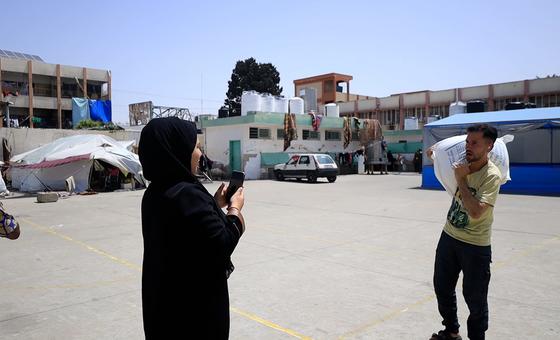From the room he and his family call home inside the school-turned-shelter, he felt a duty to let the world know what life is really like for them, through daily videos he shares on social media as the ongoing war approaches its eighth month.
UN News’s correspondent in Gaza, Ziad Talib, spoke to Mr. Al-Habal with help from his sister-in-law, Ghalia Al-Kilani, who learned sign language so she could communicate with her sister, who is also from the deaf community.
Sign of the times
“I wanted to send a message to the deaf community all over the world, so I decided to film my normal life, when houses are being bombed,” Mr. Al-Habal explained. “I use European sign language so that the idea reaches them and so that people see what is happening in Gaza.”
He likened what he does to journalistic work, tailored to people with disabilities who are deaf.
What encouraged him to continue reporting everything that happens in Gaza is the increase in the number of followers online every day.
“They began to support me and support Gaza and the Palestinian cause,” he said.
Daily struggles
Despite this social media outlet, he continues to suffer, like many displaced people in Gaza. After fleeing northern Gaza seven months ago, he still struggles to find food, water and work to support his family.
Around 1.7 million Gazans have been internally displaced, more than half of whom are children, and they do not have access to sufficient water, food, fuel and medicine.
Currently, some one million people have sought safety in UNRWA facilities that have been turned into shelters, and about two million people in Gaza depend on the UN agency’s lifesaving support even as it faces great difficulties and delays in getting its supplies into the Strip.
“I am very tired, and I am very afraid,” Mr. Al-Habal told UN News. “I fear for my wife and daughter.”
But, that does not prevent him from extending a helping hand to everyone who needs it.
“When I see children in the street, I help them until they smile and forget the bombing,” he said. “What is important is that the children are happy and that they stay away from fear.”
Silent bombs
The continuation of hostilities in Gaza puts Mr. Al-Habal in constant fear for his family. He does not hear the sounds of bombing, and a hearing aid helps him pick up only a weak echo of what is happening around him.
“Whenever my daughter cries, I hug her and reassure her,” he said.
Yet, despite the difficult circumstances and the daily hardship he experiences in finding food and water, his efforts to search for a job opportunity do not stop.

Ghalia Al-Kilani, with her brother-in-law Bassem Al-Habal and her niece in the background, in a shelter for displaced people in Deir Al-Balah, Gaza.
Challenges for the deaf
Ms. Al-Kilani helps her brother-in-law convey what he says to those who do not understand sign language.
However, she said, there is a great challenge for the deaf community in Gaza in recognising the bombing and shooting that is happening around them, which puts their lives in extra danger.
She also emphasised the extreme difficulty faced by deaf persons with disabilities, to make a living now in Gaza. That’s why she began helping him communicate his voice and message through social media.
Ms. Al-Kilani began helping him translate and communicate everything he observed and photographed around him, and right now, Mr. Al-Habal has more than 25,000 followers on Instagram.
Stories from the north
Before speaking to UN News, Mr. Al-Habal explained to his social media followers the predicament faced by friends who are deaf with disabilities in northern Gaza, which seven months ago he called home.
Some of them were killed because they did not hear the bombing and the instructions of the Israeli forces, and when others tried to move their bodies, some were hit by gunfire, he said.
Back at the small room in the shelter, Mr. Al-Habal said he will continue to publish daily videos so that the world can see what is really happening to them.
“Why does the world watch what is happening to us and remains silent?” he asked, expressing hope that “the war will stop, and life will return to normal in Gaza.”

